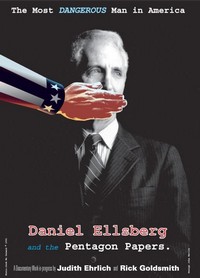The Most Dangerous Man in America
| The Most Dangerous Man in America: Daniel Ellsberg and the Pentagon Papers | |
|---|---|
 | |
| Directed by |
|
| Written by |
|
| Produced by |
|
| Starring | Daniel Ellsberg |
| Cinematography |
|
| Edited by |
|
| Music by | Blake Leyh |
| Distributed by | First Run Features |
Release dates |
|
Running time | 92 minutes |
| Country | United States |
| Language | English |
The Most Dangerous Man in America: Daniel Ellsberg and the Pentagon Papers is a 2009 American documentary film directed by Judith Ehrlich and Rick Goldsmith. The film follows Daniel Ellsberg and explores the events leading up to the 1971 publication of the Pentagon Papers, which exposed the top-secret military history of the United States' involvement in Vietnam.[1]
The film was shown on the PBS series POV in 2010, for which it earned a Peabody Award.[2][3]
Reception
Critical response
In a review for The New York Times, Mike Hale writes that the film "conscientiously notes the viewpoints of those who believe that Mr. Ellsberg betrayed his country or his former colleagues at the Defense Department" and the filmmakers "concentrate on their portrait of Mr. Ellsberg, who emerges as a complex and difficult man whose principles, whether you agree with them or not, can’t be denied."[1] Roger Ebert writes, "It is a skillful, well-made film, although, since Ellsberg is the narrator, it doesn't probe him very deeply. We see his version of himself."[4]
Mick LaSalle writes in a review for The San Francisco Chronicle, "The film is packed with stories, from numerous talking heads, including Ellsberg. A wealth of information is conveyed with complete clarity."[5] In a review for The Journal of American History, Stephen J. Whitfield notes "the most dangerous man in America" was a moniker "bestowed by Henry Kissinger, who had admired his Harvard University colleague's pioneering work in decision theory. But the film commits the unpardonable sin of leaving the title unexplained."[6]
In a review for NPR, Mark Jenkins writes that the filmmakers "sometimes rely on Errol Morris-style reconstructions of events, which are less deft than Morris'. Distractingly, they also use sketchy animation for a few sequences."[7] In a review for Variety, Ronnie Scheib writes, "While a present-day Ellsberg complains that the massive number of bombs dropped on Vietnam, which he repeatedly mentioned in press conferences back then, was never duly reported, Ehrlich and Goldsmith redress that silence with a bombardment of newsreel images of aerial destruction."[8]
The Most Dangerous Man in America has an approval rating of 96% on review aggregator website Rotten Tomatoes, based on 56 reviews, and an average rating of 7.84/10.[9] Metacritic assigned the film a weighted average score of 75 out of 100, based on 18 critics, indicating "generally favorable reviews".[10]
Awards and nominations
Nominated
Won
International Documentary Film Festival Amsterdam
- Special Jury Award
Palm Springs International Film Festival
- Audience Award Best Documentary
- Freedom of Expression Award
Mill Valley Film Festival, USA
- Audience Award Best Documentary
San Luis Obispo International Film Festival, USA
- Best In Fest
Boulder International Film Festival, USA
- Best Feature Documentary
It's All True Film Festival, Brazil
- Audience Award Best Documentary
Fresno Film Festival, USA
- Audience Award Best Documentary
Sydney Film Festival, Australia
- Best Documentary
- Audience Choice Award Co-Winner
Docaviv Film Festival, Israel
- Special Jury Mention
Traverse City Film Festival, USA
- Audience Award Best Documentary
American Historical Association, USA
- John O'Connor Film Award
History Makers Award, USA
- Best History Production
Organization of American Historians, USA
See also
- The Pentagon Papers (2003 film)
- The Post (2017 film)
References
- ^ a b Hale, Mike (16 September 2009). "Most Dangerous Man in America: Daniel Ellsberg and the Pentagon Papers, The Untold Story of a War, and the Story of the Man Who Told It". The New York Times. Retrieved 18 February 2010.
- ^ "The Most Dangerous Man in America | POV | PBS". PBS.
- ^ 70th Annual Peabody Awards, May 2011.
- ^ Ebert, Roger (24 March 2010). "His conscience leaked the Pentagon Papers". RogerEbert.com. Retrieved 17 June 2022.
- ^ LaSalle, Mick (19 February 2010). "Review: Ellsberg - 'The Most Dangerous Man'". The San Francisco Chronicle. Retrieved 17 June 2022.
- ^ Whitfield, Stephen J. (June 2010). "Reviewed Work: The Most Dangerous Man in America: Daniel Ellsberg and the Pentagon Papers by Judith Ehrlich, Rick Goldsmith". The Journal of American History. 97 (1): 277–279. doi:10.2307/jahist/97.1.277. JSTOR 40662976. Retrieved 17 June 2022.
- ^ Jenkins, Mark (4 February 2010). "Ellsberg's 'Dangerous' Decision: To Tell The Truth". NPR. Retrieved 17 June 2022.
- ^ Scheib, Ronnie (13 September 2009). "The Most Dangerous Man in America: Daniel Ellsberg and the Pentagon Papers". Variety. Retrieved 17 June 2022.
- ^ "The Most Dangerous Man in America: Daniel Ellsberg and the Pentagon Papers (2009)". Rotten Tomatoes.
- ^ "The Most Dangerous Man in America: Daniel Ellsberg and the Pentagon Papers". Metacritic.
